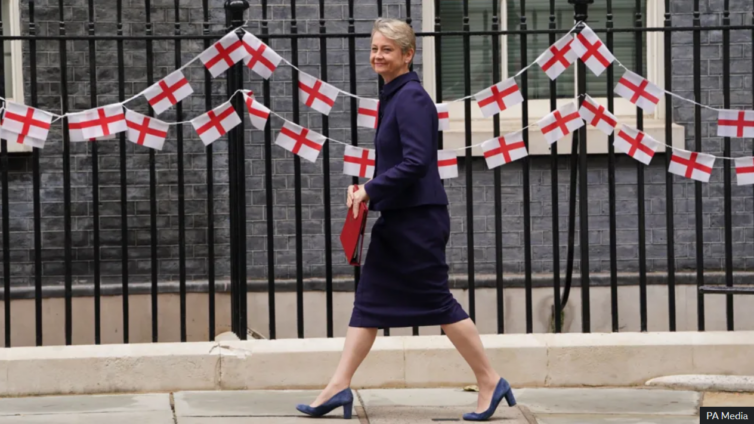Extreme misogyny will be treated as a form of extremism under new government plans, the Home Office has said.
Yvette Cooper, the home secretary, has ordered a review of the UK's counter-extremism strategy to determine how best to tackle threats posed by harmful ideologies.
The analysis will look at hatred of women as one of the ideological trends that the government says is gaining traction.
Ms Cooper said there has been a rise in extremism "both online and on our streets" that "frays the very fabric of our communities and our democracy".
The review will look at the rise of Islamist and far-right extremism in the UK, as well as wider ideological trends, including extreme misogyny or beliefs which fit into broader categories, such as violence.
It will also look at the causes and conduct of the radicalisation of young people.
Ms Cooper said the strategy will "map and monitor extremist trends" to work out how to disrupt and divert people away from them.
It will also "identify any gaps in existing policy which need to be addressed to crack down on those pushing harmful and hateful beliefs and violence", she said.
Ms Cooper said that action against extremism has been "badly hollowed out" in recent years.
The work will inform a new counter-extremism strategy, which was promised in Labour's manifesto and which the Home Office says will "respond to growing and changing patterns" of extremism across the UK.
It is not clear how long this "rapid review" will take. It is one of a number of policy reviews Labour has announced since coming to power in July, including the Strategic Defence Review, spending review and a review of the National Curriculum.
Critics might argue that some reviews are a proxy for actual action, but Labour has pointed out that there has been no new Counter Extremism Strategy since 2015, and that an assessment of new and emerging threats is overdue.
This is also not the first time the government has considered misogyny as a form of extremism.
For some years there has been concern around "Incel culture", an online movement of mainly young men who describe themselves as "involuntarily celibate" and blame women and "alpha males" for their problems.
A mass shooting in Plymouth in 2021 by 22-year-old Jake Davison, who killed five people before fatally shooting himself, was linked to Incel ideology.
At the time no further policy action was taken, but incidents like that one, and also the rise of social media influencers such as Andrew Tate - a self-proclaimed misogynist - may have pushed the new government to think again.
Latest Stories
-
Gold Fields Ghana Foundation challenges graduates to maximise benefits of community apprenticeship programme
1 hour -
GBC accuses Deputy Information Minister Sylvester Tetteh of demolishing its bungalow illegally
2 hours -
Boost for education as government commissions 80 projects
2 hours -
NAPO commissions library to honour Atta-Mills’ memory
2 hours -
OmniBSIC Bank champions health and wellness with thriving community walk
2 hours -
Kora Wearables unveils Neo: The Ultimate Smartwatch for Ghana’s tech-savvy and health-conscious users
2 hours -
NDC supports Dampare’s ‘no guns at polling stations’ directive
2 hours -
Police officer interdicted after video of assault goes viral
2 hours -
KNUST’s Prof. Reginald Annan named first African recipient of World Cancer Research Fund
2 hours -
George Twum-Barimah-Adu pledges inclusive cabinet with Minority and Majority leaders
3 hours -
Labourer jailed 5 years for inflicting cutlass wounds on businessman
3 hours -
Parliament urged to fast-track passage of Road Traffic Amendment Bill
3 hours -
Mr Daniel Kofi Asante aka Electrician
3 hours -
Minerals Commission, Solidaridad unveils forum to tackle child labour in mining sector
3 hours -
Election 2024: Engagement with security services productive – NDC
3 hours

